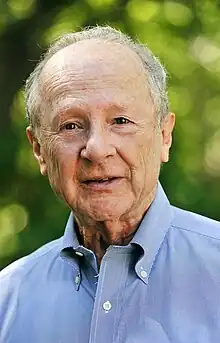Matthew Meselson
Matthew Stanley Meselson (born May 24, 1930) is a geneticist and molecular biologist at Harvard University. He is known for his demonstration, with Franklin Stahl, of the semi-conservative DNA replication.
Matthew Meselson | |
|---|---|
 | |
| Born | Matthew Stanley Meselson 24 May 1930 Denver, Colorado, U.S. |
| Nationality | American |
| Alma mater | University of Chicago (Ph.B., 1951) California Institute of Technology (Ph.D., 1957) |
| Known for |
|
| Awards | Guggenheim Fellowship, MacArthur Fellows Program Genius Award, Genetics Society of America - Thomas Hunt Morgan Medal for lifetime contributions, Lasker Award for Special Achievement in Medical Science |
| Scientific career | |
| Fields | |
| Institutions |
|
| Thesis | I. Equilibrium sedimentation of macromolecules in density gradients with application to the study of deoxyribonucleic acid. II. The crystal structure of N,N-dimethyl malonamide (1957) |
| Doctoral advisor | Linus Pauling |
| Notable students | Mark Ptashne, Susan Lindquist, Richard I. Morimoto, Sidney Altman, Nancy Kleckner, Steven Henikoff, Stephen Heinemann, Victor Corces |
After completing his Ph.D under Linus Pauling at the California Institute of Technology, Meselson became a Professor at Harvard University in 1960. He is there today as today as Thomas Dudley Cabot Professor of the Natural Sciences.
In the famous Meselson–Stahl experiment of 1958 he and Frank Stahl showed with nitrogen isotope labeling that DNA is replicated semi-conservatively.[1] In addition, Meselson, François Jacob, and Sydney Brenner discovered the existence of messenger RNA in 1961. Meselson has investigated DNA repair in cells and how cells recognize and destroy foreign DNA, and, with Werner Arber, was responsible for the discovery of restriction enzymes.
Since 1963 he has been interested in chemical warfare and biological defense and arms control. Meselson worked with Henry Kissinger under the Nixon administration to convince President Richard Nixon to renounce biological weapons, suspend chemical weapons production, and support an international treaty banning biological agents for hostile purposes. In 1972 this became the Biological Weapons Convention.
Meselson has received many awards. His laboratory at Harvard investigates the biological and evolutionary nature of sexual reproduction, genetic recombination, and aging. Many of his past students are notable biologists, including Nobel Laureate Sidney Altman, Mark Ptashne, Susan Lindquist, Stephen F. Heinemann, and Richard I. Morimoto.
Related pages
References
- Meselson, Stahl, and the Replication of DNA. A history of "the most beautiful experiment in biology", Frederic Lawrence Holmes, Yale University Press (2001). ISBN 0300085400